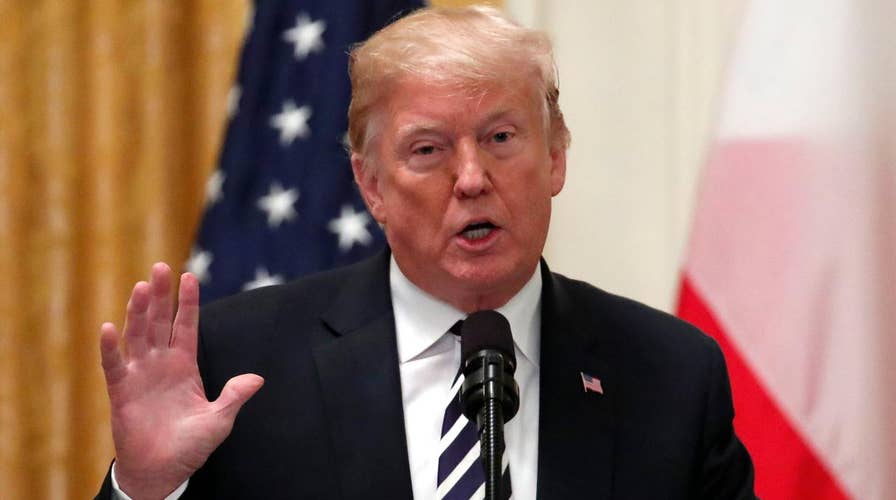An “America First” proposal to make it easier for President Trump to impose tariffs without congressional approval is meeting opposition from some Republicans and conservative groups.
The “United States Reciprocal Trade Act” was reportedly drafted by White House trade adviser Peter Navarro, who is seeking support among congressional Republicans. Trump could push the idea in his State of the Union address, though the date for the speech remains up in the air amid the shutdown standoff between him and congressional Democrats.
The bill itself would expand the executive branch’s authority to levy tariffs if the president determines the target country has negative barriers against U.S. exports.
TRUMP ALLIES WARN OBAMA-ERA FTC SUIT AGAINST US FIRM GIVING BOOST TO CHINA
But underscoring the lingering GOP divide on trade, free-market organizations like the Competitive Enterprise Institute and Americans for Tax Reform have called on Congress to fight the policy.
Sen. Mike Lee, R-Utah, who previously sponsored legislation to curb executive branch authority on trade, opposes the plan.
“Congress has already given the executive branch far too much power over far too many things,” Lee told Fox News. “We should be looking to take authority away from the executive branch on trade, not giving it more abilities to act unilaterally.”
Bloomberg News reported the draft bill says, “The lack of reciprocity in tariff levels and disproportionate use of non-tariff barriers by United States trading partners facilitates foreign imports, discourages United States exports, and puts United States producers, farmers, and workers at a competitive disadvantage.” The draft continues that the trade imbalance “contributes to the large and growing United States trade deficit in goods, which is a drag on economic growth and undermines economic prosperity.’’
Speaking Monday at the American Farm Bureau Convention, Trump said his administration is digging the United States out of unfair trade deals, noting the recent accord on the U.S.-Mexico-Canada Agreement—still pending congressional approval—and continued negotiations with China.
“We are replacing one-sided, unfair trade deals,” Trump said at the New Orleans gathering. “We have so many nations — it’s a one-sided deal. With China, every year, for many years, we’re losing $375 billion — not million, billion dollars. We’re working on that very strongly. … We’re turning all of that around with fair trade deals that put American farmers, ranchers, and, in fact, put America first.”
Under Article 1, Section 8 of the Constitution, Congress has the authority to negotiate international trade deals, or, “To regulate Commerce with foreign nations, and among the several states.”
Still, Trump used what statutory authority he had last year to unilaterally impose 25 percent levies on steel, 10 percent tariffs on aluminum, and tariffs of billions of dollars in Chinese imports.
Section 232 of the Trade Expansion Act of 1962 gave the president power to impose some tariffs without Congress for national security reasons. Sections 301 of the Trade Act of 1974 had similar loopholes to expand the president’s tariff power.
Last year, a bipartisan group of 88 senators supported giving Congress a greater role in tariffs—which might indicate a tough sell for the reciprocal bill.
Senate Finance Committee Chairman Charles Grassley, R-Iowa, whose committee would vet the reciprocal trade bill, issued a statement upon becoming chairman saying he intends to review the president’s tariffs thus far.
“While I strongly agree with President Trump that we must have fair trade deals that benefit Americans, I do not believe that we should alienate our allies with tariffs disguised as national security protections,” Grassley said. “And certainly not when it comes to trade in automobiles and auto parts. For this reason, I intend to review the president’s use of power under Section 232 of the Trade Act of 1962, which grants the president broad legal authority to impose tariffs in the name of national security. I’m not fond of the Section 301 tariffs on products from China, but I agree with the reasons they’ve been applied.”
If Grassley is not on board, it would give the tariff bill little chance of passing the GOP-controlled Senate. That’s a relief for Ryan Young, a fellow at the Competitive Enterprise Institute.
“This bill gives [Trump] more reasons legally to impose tariffs,” Young told Fox News. “He doesn't have to offer a national security rationale. He just has to decide another country has more trade barriers than the United States.”
Because the administration is not only looking at tariffs in other countries, Young added that the determination could be subjective and arbitrary if trade barriers aren’t strictly defined in the legislation.
While the economy has been strong under Trump’s policies of lower taxes and slashing regulations, Young cites a report by ImpactEcon that projected Trump’s tariff policies would reduce economic growth by 1.78 percent in 2019. So, Young said, without tariffs, gross domestic product could exceed an astounding 5 percent.
CLICK HERE TO GET THE FOX NEWS APP
“This proposal is more symbolic from the administration, but it's important that we send the right symbols,” Young continued. “This legislation grossly expands executive power.”
Fred Lucas is the White House correspondent for The Daily Signal. Follow him @FredLucasWH.













































